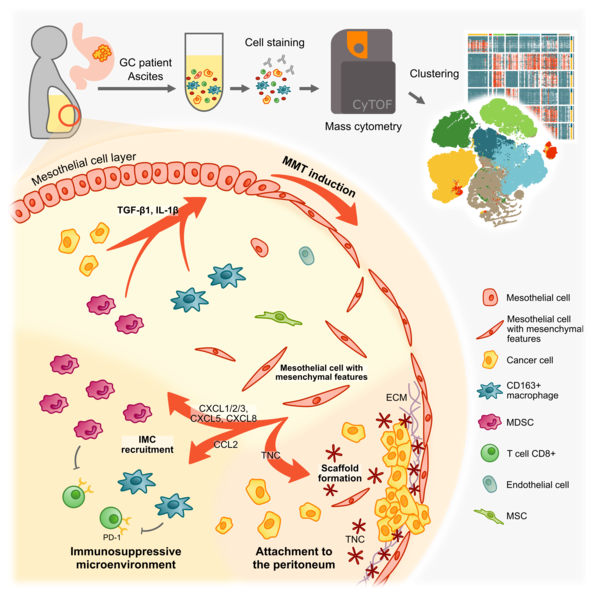- HOME
- News & Events
- Publications
- 【Publications】Mesothelial cells with mesenchymal features enhance peritoneal dissemination by formin...
Publications
【Publications】Mesothelial cells with mesenchymal features enhance peritoneal dissemination by forming a protumorigenic microenvironment
January 19 2024
Lab: Takatsugu Ishimoto (IRCMS Visiting Professor)
Paper information
Tile:
Mesothelial cells with mesenchymal features enhance peritoneal dissemination by forming a protumorigenic microenvironment
Yonemura A, Semba T, Zhang J, Fan Y, Yasuda-Yoshihara N, Wang H, Uchihara T, Yasuda T, Nishimura A, Fu L, Hu X, Wei F, Kitamura F, Akiyama T, Yamashita K, Eto K, Iwagami S, Iwatsuki M, Miyamoto Y, Matsusaki K, Yamasaki J, Nagano O, Saya H, Song S, Tan P, Baba H, Ajani JA, Ishimoto T
Cell Reports 2024/1/16 DOI: 10.1016/j.celrep.2023.113613
Highlights
- Mesenchymal cells diversity exists in malignant ascites of patients with GC
- An immunosuppressive microenvironment is formed in malignant ascites of patients with GC
- MMT-induced mesothelial cells produce chemokines involved in IMC recruitment
-
TNC derived from MMT-induced mesothelial cells enhances metastatic colonization
Abstract:
Malignant ascites accompanied by peritoneal dissemination contain various factors and cell populations as well as cancer cells; however, how the tumor microenvironment is shaped in ascites remains unclear. Single-cell proteomic profiling and a comprehensive proteomic analysis are conducted to comprehensively characterize malignant ascites. Here, we find defects in immune effectors along with immunosuppressive cell accumulation in ascites of patients with gastric cancer (GC) and identify five distinct subpopulations of CD45(−)/EpCAM(−) cells. Mesothelial cells with mesenchymal features in CD45(−)/EpCAM(−) cells are the predominant source of chemokines involved in immunosuppressive myeloid cell (IMC) recruitment. Moreover, mesothelial-mesenchymal transition (MMT)-induced mesothelial cells strongly express extracellular matrix (ECM)-related genes, including tenascin-C (TNC), enhancing metastatic colonization. These findings highlight the definite roles of the mesenchymal cell population in the development of a protumorigenic microenvironment to promote peritoneal dissemination.
Graphical abstract

